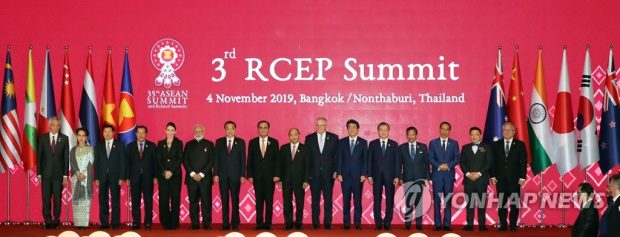South Korea’s president revs up ASEAN diplomacy, breaks ice with Abe

Bangkok: Attending ASEAN-hosted summits here this week, South Korean President Moon Jae-in had multiple goals — from drumming up support for the dormant Korea peace process to reaching out to Japanese Prime Minister Shinzo Abe.
He also placed a focus on drawing more attention to an upcoming ASEAN-South Korea commemorative summit and a separate Mekong-South Korea session in Busan. Set to open on Nov. 25, the three-day meetings would be the biggest diplomatic event to be held in South Korea since Moon’s inauguration in May 2017.
Through his two-night trip to Bangkok, he seems to have largely achieved what he intended.
The president again demonstrated his administration’s commitment to stronger strategic partnerships with Southeast Asian countries under its signature New Southern Policy.
He called for a concerted effort to safeguard free trade as he joined the 22nd ASEAN Plus Three (APT) summit on Monday, along with Japanese Prime Minister Shinzo Abe and Chinese Premier Li Keqiang.
He also stressed the forum’s role in promoting regional cooperation and addressing “supranational” challenges facing Asia, such as terrorism, climate change and disaster.
“The ASEAN Plus Three should exert leadership over issues, which are hard to resolve independently by a country,” Moon said in a speech. Later in the day, he was present at the East Asia Summit (EAS) meeting.
His aides said Moon has laid the groundwork for the successful hosting of the Busan event to commemorate the 30th anniversary of the ASEAN-South Korea dialogue partnerships. He has already kept his promise to visit all 10 ASEAN members during his tenure, which is to reach the halfway point this weekend.
In a sense, this week’s ASEAN-related sessions were a “prelude” to the Busan summits, according to Joo Hyung-chul, a Cheong Wa Dae adviser for economic affairs who chairs the Presidential Committee on the New Southern Policy.
“November is effectively a ‘Month of ASEAN-South Korea (Relations),'” he said, adding that preparations for the Busan summits entered the home stretch in Thailand and will reach the finish line in Busan three weeks later.
He added the president’s activities in the Thai capital have enhanced Seoul’s stature as a “responsible middle power” in the region.
Moon also had his first official dialogue with the Japanese prime minister in 13 months, with their countries locked in prolonged standoffs over shared history.
While Cheong Wa Dae characterized it as a face-to-face conversation, neither a formal summit nor a pull-aside, it may serve as a turning point in soured relations between Seoul and Tokyo, highlighted by their monthslong trade fight.
Their impromptu chat took place in a waiting room prior to the opening of the APT session. It lasted for 11 minutes in a “very friendly and serious” mood, and they agreed to resolve pending bilateral issues via dialogue, Cheong Wa Dae spokesperson Ko Min-jung said.
With working-level contacts under way between their foreign ministries, Moon proposed considering higher-level talks if necessary. Abe agreed to use “every available means” to warm ties between the neighboring countries.
Although there was no concrete deal, the two leaders broke the ice, at least, in Bangkok, potentially paving the way for additional talks in the near future. They will likely meet again in December when an annual trilateral summit, involving China, takes place. It’s China’s turn to host the session, but no schedule or venue has been announced.
Some pundits point out that it’s still premature to be upbeat about an imminent breakthrough in the Seoul-Tokyo relationship.
“Sustained improvement in Seoul-Tokyo ties requires a mechanism to address South Korea’s Supreme Court rulings on wartime labor,” said Leif-Eric Easley, associate professor of international studies at Ewha Womans University in Seoul. “It is largely up to Seoul to establish the legal basis for a compensation fund that builds on the existing 1965 foundation for bilateral relations.”
He was referring to a bilateral treaty on normalizing diplomatic relations after Japan’s brutal colonization of Korea from 1910-45.
Japan argues that all colonization-related compensation issues were settled in the 1965 state-to-state agreement. But South Korea’s highest court ruled that Korean victims of forced labor during World War II have their individual rights to compensation.
Moon also had a meeting with U.S. President Donald Trump’s national security adviser, Robert O’Brien, who led Washington’s delegation to the EAS forum. Moon emphasized the importance of constantly engaging Pyongyang with patience.
Moon’s economic diplomacy bore fruit as well. He participated in the third Regional Comprehensive Economic Partnership (RCEP) summit here and struck a deal on concluding related negotiations with his counterparts from 14 other participating countries.
It represents the de facto finale of tough bargaining launched in 2013, although another dialogue partner, India, was sidelined. India is still concerned about negative impact to its economy from the envisioned trade bloc apparently led by China.
India has “significant outstanding issues, which remain unresolved,” read a joint statement released after the RCEP summit.
If the Asia-Pacific trade accord is signed next year as planned and takes effect, it is expected to help spur the New Southern Policy of the Moon administration. South Korean firms will also gain force to expand trade and investment in the region. Moon is heading back to Seoul on Tuesday.
YONHAP
























































